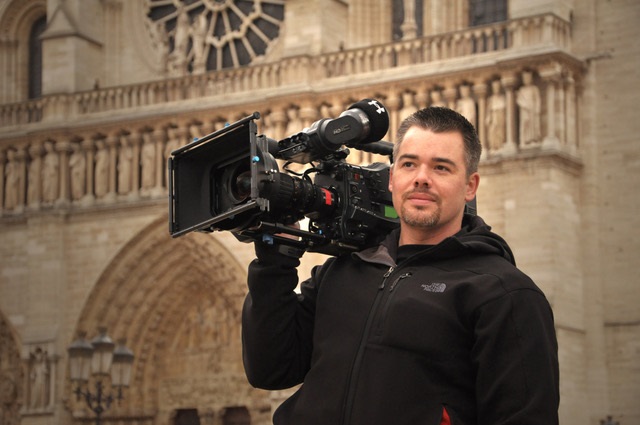By Judy Shields
Hollywood, California (The Hollywood Times) 03/02/2024 – “At it’s heart, it’s a mother daughter story,” said director Richard Bakewell about his latest movie Roswell Delirium.
ROSWELL DELIRIUM turns back the clock and revisits the 1980s from the perspective of a young woman who believes she has contacted aliens who can help cure the aftereffects of nuclear disaster. Set in an alternate timeline where the US and USSR exchanged nuclear attacks in 1986, this fantasy-drama from writer-director Richard Bakewell features a cast of 1980s icons (Anthony Michael Hall, Lisa Whelchel, Dee Wallace, Reginald VelJohnson, and Sam Jones) alongside three commanding newcomers in a story that evokes the emotional richness of Terms of Endearment alongside the haunting suspense of Close Encounters of the Third Kind.
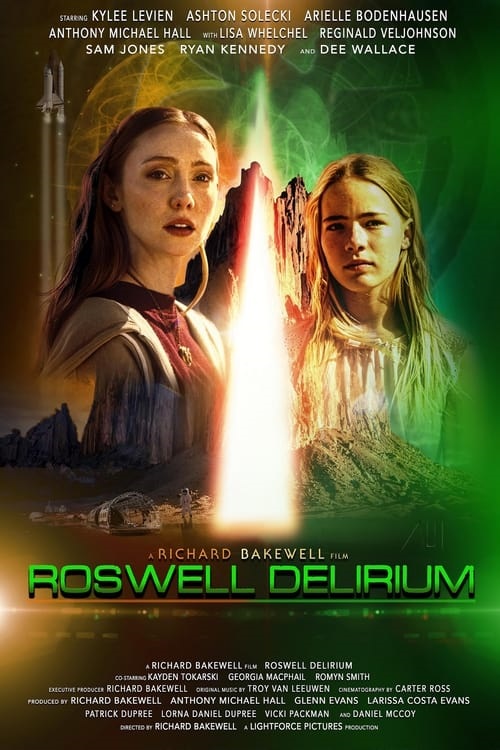
Mayday Malone (played with astonishing precocity by newcomer Kylee Levien) is in high school when the two global superpowers launch a series of nuclear attacks against each other. Living in rural New Mexico, her community is spared immediate destruction, but for years afterwards, people continue to die of diseases caused by nuclear radiation. With her emotionally distant father working for NASA and frequently away, Mayday channels her scientific curiosity and spare time into monitoring government satellite communication while her mother (Arielle Bodenhausen) tries to keep things together. From the perspective of years later, an older Mayday – now known as Firefly (played by Ashton Solecki) is facing her own mortality from disease, but believes she has found a cure in the site formerly known as Area 51, and is working through her thoughts with a therapist (Anthony Michael Hall). As the story moves between the journeys of both Mayday and Firefly, the truth about what happened to them – and what happened to the world around them – emerges in startling and unimagined ways.
The Hollywood Times had the opportunity to speak with Richard Bakewell about his movie Roswell Delirium. Enjoy the conversation:
This movie is for all those 80s fans who will recognize the great stars from sitcom and movies of the 80s. It is a really great script, from the opening scene to the closing scene with twist that will make you want to see it over and over again. Many awesome 80s props and easter eggs like Richard talks about. The arial shots of the mountain scenes and those shot in Salton Sea and done so well. It is a movie also about mental health and the struggles of a mother and daughter from the disaster they both have to face. Check out everything about this awesome movie here: https://www.lightforcepictures.com/roswell-delirium
“It started as a short film,” explains Richard Bakewell, “just eight pages long, and we were going to film it in March 2020.” For Bakewell, a veteran cinematographer, camera operator, and narrative filmmaker, the story was inspired by the unexpected emotional trajectory of his own life and career. Growing up in northeastern Ohio, Bakewell was the neighborhood kid obsessed with movies, television, and pop culture, reveling in the storytelling traditions of the 1980s and dreaming of becoming the next Steven Spielberg. After beginning his studies as a director at Columbia College in Chicago, Bakewell quickly realized that directing wasn’t the best career path, and shifted his passion to working with cameras as a cinematographer. “I felt that directing was either in your blood or not, and needed a skill I could rely on before eventually moving into the world of directing.”
“The 1980s feels like home to so many people,” Bakewell says today. “From the beginning, I wanted to have an ensemble 80s-style film, because that decade represents so many things that we care about and want to be a part of. It makes people feel good about themselves to remember that time, everything felt safe and fun.” Indeed, the film is littered with sly references to catch phrases, films, and speech patterns of the 1980s that are more than mere “Easter Eggs” for those who happen to remember the decade in such detail: in the post-nuclear war landscape of “Roswell Delirium,” those references become crucial touchstones for us to put together an alternative history that feels believable and authentic. Perhaps this is captured best by one of the film’s most dramatic turning points, when Mayday and her high school class witness the explosion of the Challenger space shuttle: her own connection to NASA through her father makes this a critical point of memory as she processes her trauma as an adult.
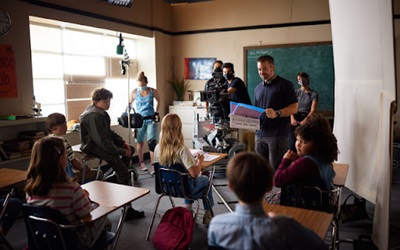
Bakewell had worked with both Kylee Levien and Arielle Bodenhausen (who plays Mayday’s mother) in The Rabbit Hole and knew that they had the talent to anchor the film, but from the outset was determined to increase the 1980s vibe by casting performers who were well known for their work in that era. First to hop on board was Sam Jones, still well-remembered from starring as Flash Gordon over four decades ago. Then, Dee Wallace (most notable as the mother in E.T.) came aboard in a critical role of a grieving grandparent. “That really gave the film a heart,” remembers Bakewell, who repeatedly watched E.T. as inspiration. She was followed by Facts of Life veteran Lisa Whelchel, who plays Mayday’s teacher struggling to keep her students focused amidst the ongoing crisis; her agent helped get Reginald VelJohnson (Family Matters, Die Hard) in another critical supporting role.
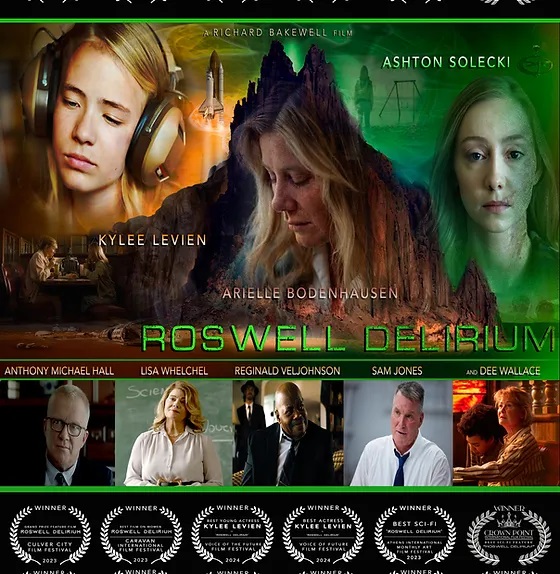
From the beginning, however, Bakewell had been thinking about The Breakfast Club: though a far cry from his sci-fi drama, the film had the sincere heart and respect for life-changing moments that also anchor Roswell Delirium. Fortunately, he found an ally in Breakfast Club star and 80s icon Anthony Michael Hall, who plays the present-day therapist attending to the unusual case of Mayday. “Anthony had his own belief about the story, about aliens, and wanted to be part of the film in any way possible,” recalls Bakewell. Eventually, Hall agreed to produce the film as well as co-star, helping Bakewell secure the resources to get the film in front of the cameras.
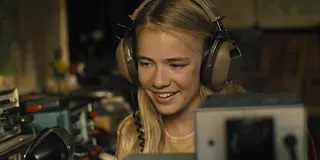
Roswell Delirium is ultimately driven by intimate human drama and not outrageous special effects or jump scares with grotesque alien monsters. Mayday’s emotional, physical, and intellectual journey as a victim of nuclear war and global trauma provides a roadmap for viewers to reimagine the way in which we valorize the past in order to cope with the pain of the present and the fear of an unknown future. Even in the making of the film, Bakewell couldn’t shake the present-day fears of so many: casting the film in early 2022, he couldn’t find a casting director who was ready to hold in-person auditions, which he considered essential to the process.
With an original score by Queens of the Stone Age guitarist Troy Van Leeuwen, exquisite production detail that captures the pre-internet technology of the 1980s (so critical to the films referred to by the characters), and a story that makes bold connections between trauma, memory, history, and redemption, the result is an original feature that will impact audiences in unexpected ways. Roswell Delirium is likely to not only evoke nostalgia for a certain kind of character-based fantasy filmmaking that peaked in the 1980s with filmmakers like Spielberg and Joe Dante, but also remind us that our own present-day existence is troubled, difficult, and harrowing – and may be creating traumas that we won’t fully understand for years to come.
Writer-director Richard Bakewell, a veteran cinematographer and television camera operator who has worked with major media figures (Gordon Ramsay, Oprah Winfrey) and on noted television docuseries (Cops, Last Chance U, Cheer), forged the story of Roswell Delirium as a response to both his own journey back from PTSD and the global response to the 2020 pandemic. The result is a rich, complex story that evokes a new perspective on the 1980s by plumbing the emotional depths of a strong heroic young woman driven by the dogged pursuit of the truth, even in the face of her own destruction.
Trailer: https://bit.ly/


